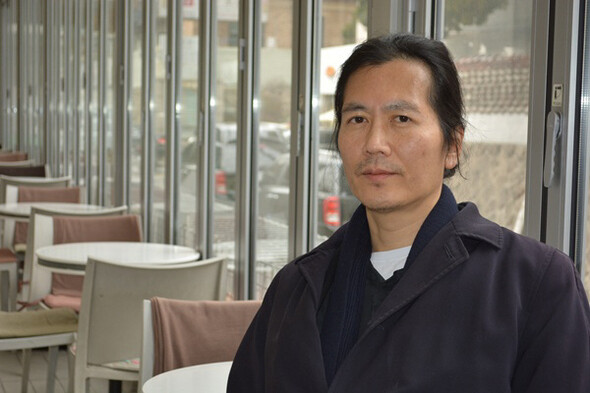hankyoreh
Links to other country sites 다른 나라 사이트 링크
Was neoliberalism the real cause of the Sewol tragedy?

By Cho Ki-weon, staff reporter
“The real killer isn’t the captain. It’s neoliberalism.”
The Korean-German philosopher Han Byung-chul, a professor at the Berlin University of the Arts and author of “Fatigue Society,” published a piece in the Apr. 26 edition of the Frankfurter Allgemeine describing the sinking of the Sewol ferry as a tragic outcome of the dehumanization caused by neoliberalism.
Han’s book “Fatigue Society” caused something of a sensation in South Korea, with its characterization of modern society as a “performance society” where people work themselves to death or exhaustion without being forced to do so.
In the recent piece titled “The Ship Is Us,” Han writes that the ferry accident “cannot be blamed on a lack of attention from the sailors, a lack of professionalism, or the special circumstances of South Korea.”
“This tragedy is a metaphor for modern society,” he concludes.
Noting that President Park Geun-hye recently described the captain of the ship as a “murderer,” Han observes, “The person who should be first to bear responsibility for the Sewol tragedy is [Park’s predecessor] Lee Myung-bak, the person who pushed the country’s neoliberal policies.”
Han notes that as recently as 2009, a passenger ship was only allowed to operate for 20 years after it was built. That period was extended to 30 years under Lee, who pushed “business-friendly” policies while serving as President from 2008 to 2013.
“These policies and their focus on business performance have greatly increased the risk of accidents,” he concludes.
Han also takes note of the fact that most of the Sewol’s crew members were irregular workers, with even the captain serving on a one-year contract - giving him the title of captain without any real authority.
“Under these working conditions, it’s difficult to develop any sense of devotion to or responsibility for the boat,” Han says. “When an accident occurs, your first action is to save yourself. Looking back on this tragedy, one could call it an example of structural violence.”
Han also points out the sharp decrease in the number of regular workers in South Korea as a result of the neoliberal policies introduced by the International Monetary Fund (IMF) during the Asian financial crisis of the late 1990s.
“As a result of neoliberalism, South Korean’s social climate became very harsh and inhumane. Everyone only thinks of his or her own survival,” he writes.
He also observes how South Korean politicians made sure to visit the scene of the tragedy to draw attention to themselves, including President Park Geun-hye, who drew criticism for a picture she took with a five-year-old girl who survived the tragedy.
According to Han, the days of captains staying on deck to the last - like Edward J. Smith, the captain who went down with the Titanic in 1912 - are a thing of the past, not just in South Korea but in other societies as well. It was no coincidence, he writes, that the captain of the Italian luxury liner Costa Concordia chose to the flee the ship first when it sank in 2012.
“Today’s society is a ‘survival society,’ where everyone is just trying to make sure they survive,” he writes.
Quoting the German economist Alexander Rustow - the person who coined the term “neoliberalism” - Han says that neoliberalism makes societies inhumane.
“Neoliberalism alienates people. In that sense, the Sewol is like a microcosm of neoliberalism,” he observes.
Having sacrificed trust, modern society is trying to replace it with transparency and control, Han writes. This echoes the conclusions of his 2012 book “Transparency Society,” in which he writes, “Transparency gives rise to forced adaptation, and in that sense contributes to stabilizing the ruling system.”
Han’s argument is that trust is the glue that holds the members of a society together and makes it stable; when trust disappears, the society depends instead on transparency and control.
“When people in a society think only of their own interests and lose a sense of community consciousness, corruption occurs,” he writes. “Transparency and control may succeed in preventing corruption, but they cannot restore common sense or trust.”
Please direct questions or comments to [english@hani.co.kr]

Editorial・opinion
![[Column] Is Korean democracy really regressing? [Column] Is Korean democracy really regressing?](https://flexible.img.hani.co.kr/flexible/normal/500/300/imgdb/original/2024/0705/2917201664129137.jpg) [Column] Is Korean democracy really regressing?
[Column] Is Korean democracy really regressing?![[Column] How tragedy pervades weak links in Korean labor [Column] How tragedy pervades weak links in Korean labor](https://flexible.img.hani.co.kr/flexible/normal/500/300/imgdb/original/2024/0703/8717199957128458.jpg) [Column] How tragedy pervades weak links in Korean labor
[Column] How tragedy pervades weak links in Korean labor- [Column] How opposing war became a far-right policy
- [Editorial] Korea needs to adjust diplomatic course in preparation for a Trump comeback
- [Editorial] Silence won’t save Yoon
- [Column] The miscalculations that started the Korean War mustn’t be repeated
- [Correspondent’s column] China-Europe relations tested once more by EV war
- [Correspondent’s column] Who really created the new ‘axis of evil’?
- [Editorial] Exploiting foreign domestic workers won’t solve Korea’s birth rate problem
- [Column] Kim and Putin’s new world order
Most viewed articles
- 110 days of torture: Korean mental patient’s restraints only removed after death
- 2Months after outcry over “torture devices,” Justice Ministry proposes more restraints for immigratio
- 3Beleaguered economy could stymie Japan’s efforts to buoy the yen
- 4[Column] Is Korean democracy really regressing?
- 5Koreans are getting taller, but half of Korean men are now considered obese
- 6[Column] How tragedy pervades weak links in Korean labor
- 7Former bodyguard’s dark tale of marriage to Samsung royalty
- 8Real-life heroes of “A Taxi Driver” pass away without having reunited
- 9[Editorial] Exploiting foreign domestic workers won’t solve Korea’s birth rate problem
- 10Democrats ride wave of 1M signature petition for Yoon to be impeached